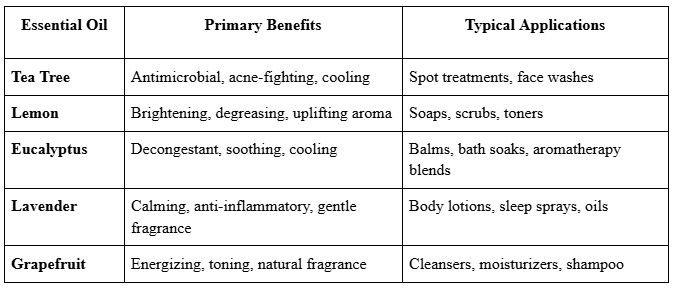Essential Oils
CAS No. Inquiry for More Information / INCI Name: Inquiry for More Information
Personal Care, Fragrance, Health & Beauty
Essential Oils are used for their therapeutic and aromatic properties in personal care products like lotions, soaps, and bath products. They are also used in fragrance products for their scent and in health & beauty for their skin benefits.
Key Benefits and Uses of Essential Oils:
Aromatherapy
Promote relaxation, invigoration, or stress relief depending on the oil (e.g., lavender for calming, grapefruit for energizing).Skin Care Enhancer
Contribute antimicrobial, anti-inflammatory, or antioxidant effects (e.g., tea tree for acne, eucalyptus for cooling).Natural Fragrance
Impart fresh, floral, citrus, or herbal scents to lotions, soaps, oils, and sprays.Multi-functional Support
May act as mild preservatives, toners, or skin-penetration enhancers in natural formulations.Consumer Appeal
Recognized and valued by consumers seeking “clean,” plant-based, or holistic beauty solutions.
Common Essential Oils and Their Uses:
Why Choose Essential Oils?
Versatile Functional and Fragrance Roles
Naturally Derived and Plant-Based
Enhance Product Scent and Skin Feel
Broad Consumer Recognition and Appeal
Customizable Blending for Signature Formulas
Important Safety Information:
Phototoxicity: Citrus oils (e.g., lemon, grapefruit) may cause photosensitivity when applied before sun exposure.
Skin Sensitization: Some oils can cause allergic reactions or irritation in sensitive individuals or when used undiluted. Perform patch testing.
Flammable: Most essential oils are flammable—store away from open flames and heat.
Proper Dilution Required: Must be diluted in a carrier oil or base product to avoid skin damage. Follow dermal limit guidelines.
Regulatory Compliance: Ensure ingredient declarations and safety limits comply with local cosmetic regulations (e.g., IFRA, EU SCCS).


Quality
Premium ingredients for various global industries.
Contact Us
Service
Email: info@ezchemicals.ca
Phone: +1 (905)-602-7333
© 2025. All rights reserved.
Privacy Policy
Office and Warehouse: 5925 Tomken Rd. Unit 18-19. Mississauga, Ontario, Canada, L4W 4L8
Mailing: 1709 Pickmere Court. Mississauga, Ontario, Canada, L4X 1Z3
